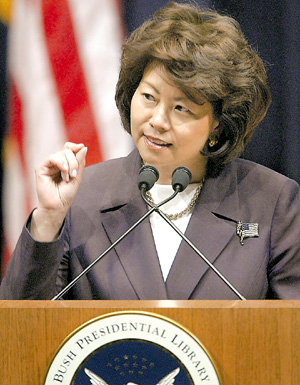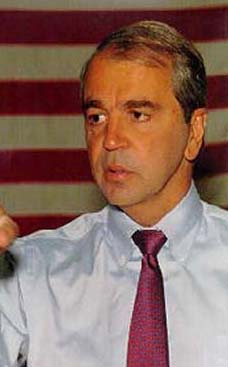
Elaine Chao was the first Asian American to serve as director of the Peace Corps. She has served as the nation's Secretary of Labor since 2001.
Labor Secretary Elaine Chao says her record on health and safety, pension recovery and white-collar overtime speaks for itself
Workplace politics
Aug 1, 2005 - Workforce
Rejecting criticism that her department is more closely aligned with companies than workers, U.S. Labor Secretary Elaine Chao says her record on health and safety, pension recovery and white-collar overtime speaks for itself
HIGH PROFILE (Clockwise from bottom left) Chao's post has put her in the public eye with such power players as Fed chairman Alan Greenspan, Sen. Chuck Grassley and, of course, President Bush.
FROM A SPACIOUS Washington office with views of the Capitol from one window and the Carpenters' Union from another, Secretary of Labor Elaine Chao presides over the agency with a commanding presence and seemingly boundless energy.
She's understandably pleased that U.S. employment figures show improvement, even though the numbers aren't consistent from month to month. In April, the economy added 292,000 jobs, a figure that dipped to 104,000 in May, then picked up again in June to 146,000. Unemployment in June was 5 percent, down from 5.6 percent the year before.
But even when job-related news isn't good, as was the case for much of President Bush's first term, the people who work closest with her say the secretary is unflappable, tough and highly focused.
"Our mission," she said during a recent interview, "is to ensure the competitiveness of the American workforce."
She was an 8-year-old girl who spoke no English when she immigrated to the U.S. from Taiwan with her family in 1961. Today she manages a budget of about $55 billion, 17,000 full-time employees and 25 divisions, including the Occupational Safety and Health Administration and the Bureau of Labor Statistics, and travels extensively.
This year her official duties have taken her to Switzerland twice, once for the annual World Economic Forum in Davos; to London for a meeting on retirement issues with fellow G8 labor ministers; and to Uruguay, where she led the U.S. delegation to a presidential inauguration. Domestically, she might be found visiting an industrial electronics lab at a community college in Tuscaloosa, Alabama, to observe a program dedicated to training workers for higher-paying jobs, or perhaps accompanying President Bush on his tour to promote changes in Social Security.
She is married to Mitch McConnell, the senior senator from Kentucky and the second-ranking Republican in the U.S. Senate.
"She's thoughtful and a hard worker, and conducts herself at a level you would expect from an executive," says Samuel Skinner, the former secretary of transportation for whom Chao served as a deputy secretary. Skinner describes her as decisive and "orderly" and credits her with making good hiring decisions.
One recruit is her top deputy, Steven Law, a veteran Washington attorney with a congressional background who served for five years as her husband's chief of staff.
Rep. George Miller, D-California, the ranking member on the House Committee on Education and the Workforce, says that he generally supports moves in recent years to make Labor Department agencies "more efficient and less intrusive." But he says that under Chao the department has become more lax in protecting the American worker. He's critical of the department for aligning itself with companies rather than workers on issues such as job safety.
Chao disagrees with the assessment and says that OSHA has reduced the number of workplace injuries to historic lows, has forged partnerships with companies to boost compliance with safety laws and has fined violators. She says the agency's response to companies that deliberately break the law is "very swift and harsh."
HAMMER TIME Chao gets into the swing of things during a tour at the Treasure Island Job Corps in San Francisco.
ENCOURAGEMENT The labor secretary assists a job seeker at a One- Stop Career Center. Chao says her goal is to ensure fulfillment for individual workers.
Though Chao won't talk about her relationship with Bush or what it's like to get a job review from the president of the United States, she says she admires him as a leader who clearly communicates his principles. "We all have a pretty good idea what we're supposed to be doing," she says. "He doesn't get enough credit for how much he cares about these issues. He's a champion of the underdog."
During the interview, Chao answered questions ranging from her own personnel management style to the state of pensions today.
Workforce Management: What are your strengths as a manager?
Elaine Chao: I am good at picking the right people and assembling an effective team. You have to pick a team with diverse strengths so that any weaknesses will be overlapped by others. Having a diverse team enables us to be nimble and responsive because we have different sets of eyes looking out over the same landscape.
If someone has an idea, they come and see me. The reason that's helpful: When you're in government, there are so many stakeholders. Reality is what each one of us sees based on our own experiences. Most of the time we only see a sliver of the real environment.
When I was growing up, the immigrant community which formed my world was so small. Had my parents not encouraged me, I wouldn't have explored as much as I did. I love to explore. I chip away at things. And I ask people for help. None of us has the corner on talent. We have to have the humility and the confidence to ask for help.
WM: And your weaknesses?
Chao: I'm too impatient. It takes patience to map out your course of action, work with others and know the difference between pushing too much and not pushing enough.
WM: How do you measure your own performance?
Chao: When you're a leader in a public position like this, or a local leader, or a nonprofit leader, there are many sources of feedback-some pleasant, some unpleasant. A truly successful leader learns to ascertain the feedback the environment is giving you. I have a diverse team, and they don't hesitate to come in here and tell me I'm wrong.
I listen to my peers, people inside and outside the building, and to those who disagree with us. I lead by example. I will never ask them to do anything I wouldn't do. If we decide on a course of action, I'm out front.
WM: What two Department of Labor programs are you the most proud of?
Chao: The first one is the updating of the white-collar overtime regulations, which had been in existence for over 50 years. Over time, they became less relevant to the modern workplace, with the consequence that a lot of people were losing overtime protection. Every administration since President Jimmy Carter has sought to modernize them. We have ensured and strengthened overtime protection for over 6.7 million working Americans.
I'm proud of our enforcement record across the board. We have recovered more pension assets for more people than ever before, and we did so in a rather innovative way: by targeting the bad actors and ensuring that our resources and our collaborative efforts were focused.
We are enforcing the laws of this department in a targeted fashion and we're working collaboratively with workers and employers. Safety doesn't come about from working with any one group. Safety comes about because there's a culture inculcated in an organization that safety is a core value.
We are firm believers in our mission to protect workers at the workplace, ensure their retirement security and make sure they're compensated appropriately. I think the fact that we have had the best health and safety record, recovered the most assets in pension cases and back pay is a reward in itself.
WM: How do you connect with ordinary people whom department policies affect?
Chao: I get letters of criticism, faxes, e-mail. I'm also on the road a lot. Every weekend, I go home to Kentucky. There's a real link to reality. We go to grocery stores, the supermarket, we pick up the dry cleaning. We go to events. We feel grounded there.
WM: When you meet people in an uncontrolled setting, like a supermarket, what do they say?
Chao: It depends what the news is. Many times we're asked about issues. Most of the time, it's just to thank us for serving our country, for being willing to go through the experience. That's the most common reaction.
WM: What do you tell people who have lost a job?
Chao: The most important thing I tell them is don't lose confidence in themselves. When self-confidence is decreased, it's very hard to go out the door. I want them to feel good about themselves. This is just a period they're going through. There's a great deal of assistance programs, and people who stand ready to help them.
My goal is to ensure hope and opportunity and the fulfillment of individual workers. Our workforce is our nation's most valuable asset. We have to nurture this talent pool, make sure they're competitive by ensuring that the workforce is well-educated and that they're continuously being trained and retrained to meet the new opportunities in the modern workforce.
WM: What is the role of the union in the modern workplace? What two things do you wish unions would do differently?
GLOBE-TROTTER Chao, whose duties ensure a busy international travel itinerary, visits the Fatima al-Zahra Women's Rights Center in Iraq.
Chao: I don't think the world is so neat like that. I think the role of organized labor is evolving. They comprise approximately 12.4 percent of the workforce, and about 7.9 percent of the private sector workforce. The world is changing, and I think organized labor is trying to find its relevance in the changing workplace. We have a dynamic and flexible workplace \and workforce. People nowadays want more flexibility, portability of benefits, greater training.
WM: Some perceive the Labor Department as being hostile to organized labor. Why do you think that is?
Chao: I'm really sad to hear that, because that is certainly not the intent. We want to work with everyone who wants to work with us. We're focused on the realities of the modern workforce. We need everyone who is involved in the workplace to work in a collaborative effort to address challenges of the workforce in the 21st century.
We are now part of a worldwide economy. The traditional old dichotomy of labor and management are not as relevant in today's environment. We should be talking about working together to help the workforce become more competitive so we can be more competitive internationally.
WM: Some have suggested that there's a "moral hazard" involved in current pension policy, that having federal guarantees simply encourages reckless behavior by some in the business community. Do you agree?
Chao: Well, the system is what it is. It's enacted by law and it's the current system under which we operate. I am more concerned about the workers, retirees, the soon-to-be retirees. The Pension Benefit Guaranty Corp. already pays retirement benefits of over a million retirees.
The focus of the president's pension reform package is targeted to ensure that promises made are promises kept. The circa-1991 premium should be increased. Companies with underfunded plans should have to put more money in, and companies with healthy plans should have the option of putting more money into their plans if they want to in a given year.
WM: There are indications that the administration may amend the Family and Medical Leave Act. What changes do you believe are necessary, and why?
Chao: I think that family and medical leave, as a portion of the Family and Medical Leave Act, is a welcomed provision for family life in this country. In the 10 years since the law has been enacted and regulations issued, there have been a number of legal challenges ... that point to ambiguous areas. We have a legal obligation to clarify it. We have been considering areas where we could provide better guidance, but no final decisions have been made.
HR ON HER MIND Chao shares her views on retirement security with SHRM and the Greater Cincinnati Human Resources Association.
WM: What do you think companies should do to help maintain the balance between work and family?
Chao: Working families face challenges that can make their lives stressful, particularly when both parents work. There are ways that employers can help workers maintain a balance between work and family. Among these are comp time and flextime policies. Under flextime, workers can choose to vary their schedules within an 80- hour workweek. Under comp time, workers can choose to take paid time off instead of overtime pay.
Both of these policies are voluntary and empower workers, giving them more flexibility and more choices, and help them spend more time with their families. These are options that federal employees currently enjoy, and I think it makes sense for workers in the private sector to have the same choices as well.
WM: You are married to Sen. McConnell of Kentucky. What do you talk about at home?
Chao: We don't talk about work. We're both so busy and we have so little time to spend with one another that when we're together we talk about what most couples talk about: where we're going to dinner, who's going to put out the garbage, what our weekend plans are, what we're doing tomorrow, who's going where.
The pace of my job leaves little time for outside interests, but I spend a lot of time with my husband in our home state of Kentucky. I especially love Cumberland Lake, where our friends have a houseboat. My husband is the love of my life, and it's very relaxing to spend time with our friends at home.
WM: Are you concerned about the effect that offshoring has on U.S. workers?
Chao: I'm concerned about every person who loses his or her job, but let me put some of this into perspective. We have a workforce of 149 million people. Outsourcing is approximately 300,000. We can't talk about outsourcing without mentioning in-sourcing, because we're in a worldwide economy. We have about 22 million Americans whose jobs depend on trade. If we isolate ourselves from the worldwide economy, we're going to put into jeopardy the jobs of these 22 million Americans who work in trade or with foreign companies who will do business here.
WM: What topics came up with the labor ministers at the recent G8 meeting in London?
Chao: The theme was the aging population and what public policy makers should do in light of the tremendous demographic shift. Europe and Japan are faced with a declining birthrate and concerns about how to support the retirement benefits of the retired workforce. Europe has increasingly fewer options because they're right at the precipice (of change).
"I'm proud of our enforcement record across the board. We have recovered more pension assets for more people than ever before, and we did so in a rather innovative way: by targeting the bad actors and ensuring that our resources and our collaborative efforts were focused."
-Elaine Chao
BIOGRAPHY
Elaine Chao
Age: 52
Birthplace: Taipei, Taiwan
Title: Secretary of labor
Affiliation: Republican
Background: Received her undergraduate degree in economics from Mount Holyoke College in South Hadley, Massachusetts, in 1975 and her MBA from Harvard Business School in 1979.
Work experience:
1979-83: Senior lending officer, Citicorp
1983-84: White House fellow
1984: Assistant professor, St. John's University
1984-86: Vice president of the capital markets group, BankAmerica
1986-88: Deputy maritime administrator, U.S. Department of Transportation
1988-89: Chairman, Federal Maritime Commission
1989-91: Deputy secretary, U.S. Department of Transportation
1991-92: Director, Peace Corps
1992-96: President and CEO, United Way of America
1996-2001: Senior editor, distinguished fellow, the Heritage Foundation
2001-present: Secretary of labor
Sources: U.S. Department of Labor Web site, Who's Who in the World
Workforce.com
Two Labor Department deputies talk about their boss: workforce.com/chao
JONATHAN PONT is a Workforce Management staff writer based in New York. To comment on this story, e-mail editors@workforce.com.
Copyright Crain Communications, Incorporated Aug 2005











